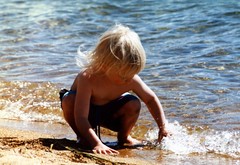Note: This is not a sample of how I would document this activity that the children did but this post expresses how children can learn through their natural environment and play based, 'real life' or 'hands on' activities that are relevant to daily life.
"The best things in life are free" and so is gardening and the natural environment! Plus getting messy is fun!
Reasons why children should be involved in gardening activities:
Children
develop socially from gardening as expressed in the Early Years Learning Framework:
Children...
"...take considered risk in their decision-making and cope with the unexpected" Outcome 1.2*
"...celebrate and share their contrinbutions with others" Outcome 1.3
"...show interest in other children and being part of a group" Outcome 1.4
"...engage and contribue to shared play experiences" Outcome 1.4
"...reflect on their actions and consider consequences for others" Outcome 1.4
"...listen to others ideas and respect other ways of being and doing" Outcome 2.2
"...experience the benefits and pleasures of shared learning exploration" Outcome 4.4
*Example... Outcome 1.2 explanation: Children have a strong sense of identity (Outcome 1) and Children develop their emerging autonomy, inter-dependence, resilience and sense of agency (point 2) expressed as
"...take considered risk in their decision-making and cope with the unexpected"
Construction
Children develop their respect and wonder for their natural surroundings and learn
construction and
geometry through gardening as expressed in the Early Years Learning Framework:
Children...
"...demonstrate an increaseing knowledge of, and respect for natural and constructed environments" Outcome 2.4
"...explore, infer, predict and hypothesise..." Outcome 2.4
"...show growing appreciation and care for natural and constructed environments" Outcome 2.4
"...use their senses to explore natural and built environments" Outcome 4.4
Children develop problems solving skills or scientific and mathematical (geometry) skills by gardening...
How to create a perfect circle flower bed (geometry)...
Children develop their problems solving skills or scientific and mathematical skills through gardening as expressed in Outcome 4.2:
Children...
"...make predictions and generalisations about... aspects of the natural world and environments, using patterns they generate or identify and communicate these using mathematical language and symbols"
"...use reflective thinking to consider why things happen and what can be learnt form these experiences"
 ...use a stick in the middle and a string to measure the radius...
...use a stick in the middle and a string to measure the radius...

Children learn to communicate and share their 'learnings':
 |
| Children feel a sense of pride in sharing their 'learnings' with their parent/s. Children are able to "celebrate and share their contributions and achievements with others"(Outcome 1.3) and "recognise the contributions they make to shared projects and expriences"(Outcome 3.1) |












